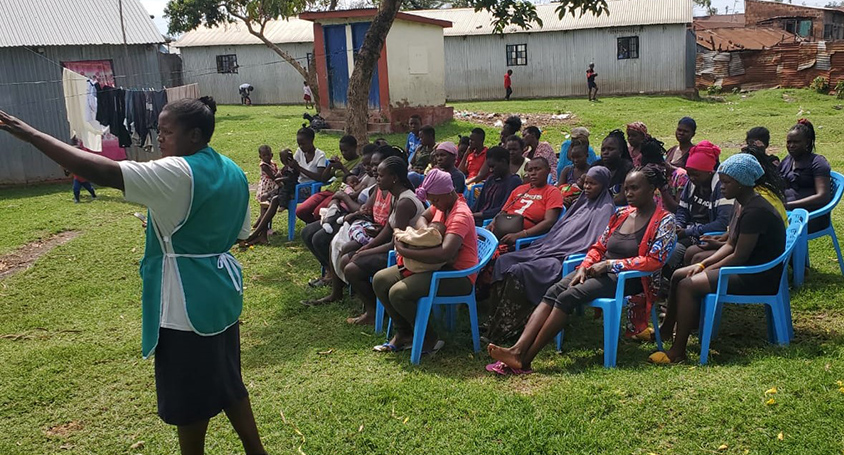REVIVE-IPTp: Strengthening communities to prevent malaria in pregnancy in western Kenya

Malaria remains a critical threat to maternal and infant health in sub-Saharan Africa, with devastating consequences that include severe anaemia and postpartum haemorrhage in mothers, and low birth weight, preterm delivery, and stillbirth in the baby. In western Kenya, however, a new approach is showing promising results.
With support from the EDCTP2 programme and implemented by the Population Council Kenya and county-level partners, the REVIVE-IPTp project focused on innovative ways to increase pregnant women’s access to malaria protection in Kisumu and Migori. Departing from top-down campaigns, the project brought malaria prevention into the centre of community life.
A community-driven approach to prevention
The REVIVE-IPTp project centres on a simple yet effective intervention: delivering preventative antimalarial medication, Sulfadoxine-Pyrimethamine (SP), to pregnant women at key intervals during pregnancy. Although national guidelines in Kenya recommend intermittent preventive treatment in pregnancy (IPTp) with SP, many pregnant women were missing out due to factors like long clinic waits, drug supply disruptions, and limited awareness.
REVIVE-IPTp tackled these challenges through a community-driven model: equipping frontline staff, mobilising local volunteers, engaging community health workers, and forging feedback links between households and healthcare providers. By making SP available where patients seek care and training local staff, the project translated healthcare guidelines into everyday practice.
Remarkable outcomes in key malaria indicators
A repeated cross-sectional survey involving more than 4,000 pregnant women across Kisumu and Migori tracked progress before, during, and after the intervention. The results from Kisumu were especially encouraging:
- The proportion of pregnant women receiving three or more doses of SP (the recommended regimen) jumped from 50.7% to 77.2%, indicating greater awareness and improved health system support. Provider adherence to correct SP dosage also rose, from 57.9% to 68.1% in Kisumu and from 44.7% to 66.8% in Migori.
- Substantial declines in malaria cases among pregnant women were also reported, with Kisumu seeing a rate fall from 30.6% to 19.1%.
- Community willingness to participate in local, community-based healthcare approaches increased significantly, with Kisumu’s acceptance rates climbing from 24.5% to 62.4% and Migori’s from 25.3% to 77.2%.
Learning and adapting through community dialogue
Beyond statistics, the project’s commitment to listening to women, their partners, and frontline healthcare workers yielded vital insights. Barriers to IPTp uptake ranged from lack of awareness to practical challenges such as service availability and long facility queues. Feedback mechanisms allowed service providers to adapt, and a systematic review reinforced the value of community healthcare worker involvement, tailored communication, and ongoing training.
Challenges remain, but progress is clear
Although awareness of the importance of IPTp increased and adherence to dosage improved, knowledge gaps persisted about when to start treatment and the total number of recommended doses. Notably, climate change emerged as a new challenge, with floods and other events disrupting access to antenatal care facilities for roughly one in five women surveyed.
The road ahead
REVIVE-IPTp’s success in increasing IPTp uptake and establishing a community-led model provides a valuable foundation for scaling similar health initiatives. The team will conduct further analyses to identify the most effective strategies and assess climate change impacts on maternal healthcare services. By institutionalising community-based delivery, maintaining a steady SP supply, and reaching underserved groups, the project helps drive Kenya toward eliminating malaria among mothers and babies. Additionally, the results of REVIVE-IPTp offer a blueprint for governments and partners to expand sustainable, cost-effective, life-saving interventions.
More information
- Matanda Dennis, et al. Community directed-based approaches to promote uptake of Sulfadoxine-Pyrimethamine for intermittent preventive treatment of malaria in pregnancy: Endline findings from Kisumu and Migori Counties,” report. Nairobi: Population Council-Kenya (2025).
- Koita, K et al. Community-based strategies to increase coverage of intermittent preventive treatment of malaria in pregnancy with sulfadoxine-pyrimethamine in sub-Saharan Africa: a systematic review, meta-analysis, meta-ethnography, and economic assessment. The Lancet. Global health 12,9 (2024): e1456-e1469. doi:10.1016/S2214-109X(24)00228-6
- Watch: Revive IPTp: Implementing Innovative Community-Based Approaches to Address Malaria in Pregnancy
- Blog post: Community Engagement: A Bridge to Increasing Uptake of IPTp-SP to Prevent Malaria in Pregnancy
Watch: Revive IPTp launch of the endline report
Project at a glance
Project: Revive-IPTp project
Project lead: Dr Dennis Matanda, Population Council Kenya
Country involved: Kenya
Target population(s): Pregnant women
Year funded: 2020
EDCTP funding: €2.25 M
Grant agreement: CSA2018HS-2521
